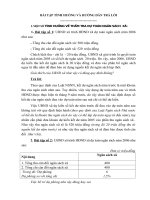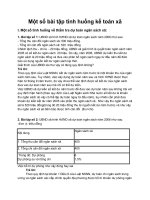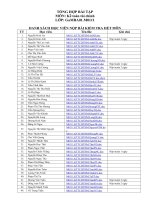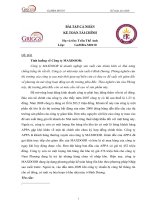Bài tập tình huống về toàn cầu hóa case study 3 the feng shui kingdom
Bạn đang xem bản rút gọn của tài liệu. Xem và tải ngay bản đầy đủ của tài liệu tại đây (41.86 KB, 4 trang )
April 27, 2005
The Feng Shui Kingdom
By LAURA M. HOLSON
When building the new entrance to Hong Kong Disneyland, Walt Disney executives
decided to shift the angle of the front gate by 12 degrees. They did so after consulting a
feng shui specialist, who said the change would ensure prosperity for the park. Disney
also put a bend in the walkway from the train station to the gate, to make sure the flow of
positive energy, or chi, did not slip past the entrance and out to the China Sea.
Heeding the advice of a feng shui consultant is one of many steps Disney executives have
taken at the park to reflect the local culture - and to make sure they do not repeat some
mistakes of the past.
When Disney opened Disneyland Paris in a former sugar beet field outside Paris in 1992,
the company was roundly criticized for being culturally insensitive to its European
guests. Now Disney burns incense ritually as each building is finished in Hong Kong, and
has picked a lucky day (Sept. 12) for the opening.
The financial stakes are high: international growth is a critical part of Disney's expansion
efforts. In Asia, Mickey Mouse, Buzz Lightyear and Winnie-the-Pooh are hardly
household names, and Disney wants to change that. Mainland China is expected to
become one of the world's largest tourist destinations in the next 15 years, according to
the World Tourism Organization, an international group that oversees policy issues. That
trend bodes well for Disney, as Hong Kong itself is already in the top 15.
"It used to be Disney was exported on its own terms," said Robert Thompson, a professor
of popular culture at Syracuse University. "But in the late 20th and early 21st century,
America's cultural imperialism was tested. Now, instead of being the ugly Americans,
which some foreigners used to find charming, we have to take off our shoes or belch after
a meal."
Plans for Hong Kong Disneyland, Disney's 11th theme park and a replica of the original
Disneyland, began in 1999 for the undeveloped Lantau Island, a 30-minute train ride
from downtown Hong Kong. Built on Penny's Bay and flanked by mountains, the park is
a venture with the Hong Kong government and the first of the parks that Disney wants to
build in China, including one in Shanghai. Disney invested $316 million for a 43 percent
equity stake in Hong Kong Disneyland; the rest is owned by the Hong Kong government,
which contributed $419 million. (The park has $1.1 billion in debt.)
Some of the dazzling visual effects and nods to cultural differences at Hong Kong
Disneyland may seem like so much marketing. One of the park's main ballrooms, which
will surely be used for Disney's popular wedding services, measures 888 square meters,
because 8 is thought to be a number of fortune, said Wing Chao, who is the master
planner of architecture and design at Walt Disney Imagineering. In Chinese, the number
four is considered bad luck so there are no fourth-floor buttons in the elevators at the
Hollywood Hotel or other hotels in the park.
Cash registers are close to corners or along walls, where such placement is believed to
increase prosperity. And in the park's upscale restaurant, Crystal Lotus, Disney installed a
virtual koi pond where computer-animated fish dart away from guests who walk on a
glass screen. The pond is one of five feng shui elements in the restaurant; the others are
wood, earth, metal and fire, which glows on a screen behind bottles in the bar. "We could
not have real fire because of the fire code," said Mr. Chao.
After the mishaps at Euro Disney and, closer to home, problems with attendance at its
California Adventure park in Anaheim, it is easy to understand why the company would
take such pains. "I don't know anything about fire and kitchens and where fire belongs
and what doesn't," said Jay Rasulo, president of Disney's theme parks and resorts
division. "But I certainly have learned that you need to respect people."
Tourists sniffed at California Adventure when it opened in 2001, saying it looked more
like a shopping mall than a theme park. In recent years, Disney added, at considerable
expense, the Tower of Terror thrill ride and an attraction based on the animated film "A
Bug's Life."
The French government recently helped bail out Euro Disney, the parent company of
Disneyland Paris, offering loan concessions and investments to save it from bankruptcy.
Though its finances have been restructured, Euro Disney is still about $2 billion in debt.
And many in the entertainment industry considered the opening of Disneyland Paris a
study in how not to open a theme park.
Mr. Rasulo, who was president of Euro Disney from 1998 to 2000, said Disneyland Paris
grew quickly as a tourist attraction in Europe, with 10 million visitors its first year. But he
conceded the park was initially larger than it should have been, and was financed using
too much debt.
Profits at Euro Disney in recent years have been slim to nonexistent; the park has shown
a net loss for the last three fiscal years, according to Disney. By contrast, Hong Kong
Disneyland is being built in two smaller phases, and is carrying half the debt of its French
sibling.
Disneyland Paris got off to a bad start by not offering wine when it opened, a culinary
faux pas among the French. After wine was later introduced, Disney hoped to placate
parkgoers by offering more French food. "Our guests told us, 'Guess what? That's not
what we want,' " Mr. Rasulo said. What they wanted, he said, was distinctly American
corn bread and barbecued chicken.
Disney also misunderstood how Europeans plan vacations. Unlike Americans, who often
book their trips directly with Disney, Europeans rely more on travel agents. In 1992,
Disney did not adequately train travel agents, leading to fewer bookings, said Mr. Rasulo.
By contrast, Disney marketing executives in Asia have been training travel agents for
months, mostly in China, where the company expects one-third of the park's business to
come from.
Teaching the Chinese about Disney may be critical to the park's success there. Disney
merchandise and characters are little known in Asia outside of Japan, where the company
has had a successful theme park for 22 years. China, in particular, has resisted the spread
of Western culture. For Disney, analysts say, Hong Kong Disneyland is an opportunity to
introduce new generations to princess costumes, Winnie-the-Pooh stuffed animals and
Mickey Mouse T-shirts.
Last year Disney hired the Chinese pop singer Jacky Cheung to host the "Magical World
of Disneyland," a television show where classic animated films like "Tarzan," "Dumbo"
and "Alice in Wonderland" are introduced to the Chinese. Based on the format developed
and made popular by Walt Disney, Mr. Cheung gives a brief introduction of Disney and
the theme park before the movie starts.
Because of the diverse cultures in Asia, said Mr. Rasulo, Disney had to be flexible. Park
employees will speak three languages: English, Cantonese and Mandarin. At a recent
tasting of dishes to be served in the park's eight restaurants - everything from curry to
noodles to sushi - Disney executives considered a hamburger prepared by a local chef.
"I've had curry before and I've had sushi before, but this was a hamburger that didn't taste
like a hamburger that I knew," said Tom Fitzgerald, a senior creative executive at
Imagineering. (He said it tasted like pork meat loaf.) "You don't want to say, 'Well, this is
the way we make a hamburger in the States and so that's the way we're going make a
hamburger here.' " Disney went with the proposed burger.
The park has a topiary garden where Minnie and Mickey Mouse and other characters will
pose for photographs with guests, a favorite pastime with international parkgoers. One of
the most anticipated attractions is the Jungle River Cruise. Unlike other parks with a
similar attraction, Disney has created Cambodian ruins for guests to float past, and an
unruly pack of hippos. "Instead of the guns that scare off the hippos, we actually have our
hippos in Hong Kong have bad breath and then they belch," said Mr. Fitzgerald.
While talk of feng shui may seem like overkill to those with Western sensibilities, Mr.
Rasulo said that as a practice it was just common sense. Mr. Rasulo said Mr. Chao came
to his office recently and suggested putting a mirror on the wall behind his computer.
"Now if my secretary wants to get my attention I can see her in the mirror," said Mr.
Rasulo, with a laugh. "So it actually is an incredibly practical thing."
1. Discuss the issue of culture and business of Disney with information provided
from the article, further research for data from other sources is encouraged.
2. Why did Disney become over-sensitive in terms of culture in the case of Hong
Kong Disneyland? How did being culture-literate help Disney?
3. How can Disney avoid making culture-related mistakes?
4. Imagine that Disney decided to open yet another theme park in Saigon and your
group is hired to give them advice in terms of culture. What are the advice you
give them? (Be specific, for instance, whether or not they use Vietnamese
traditional characters like Thạch Sanh, Thánh Gióng, or just pure American and
Western popular characters?)









